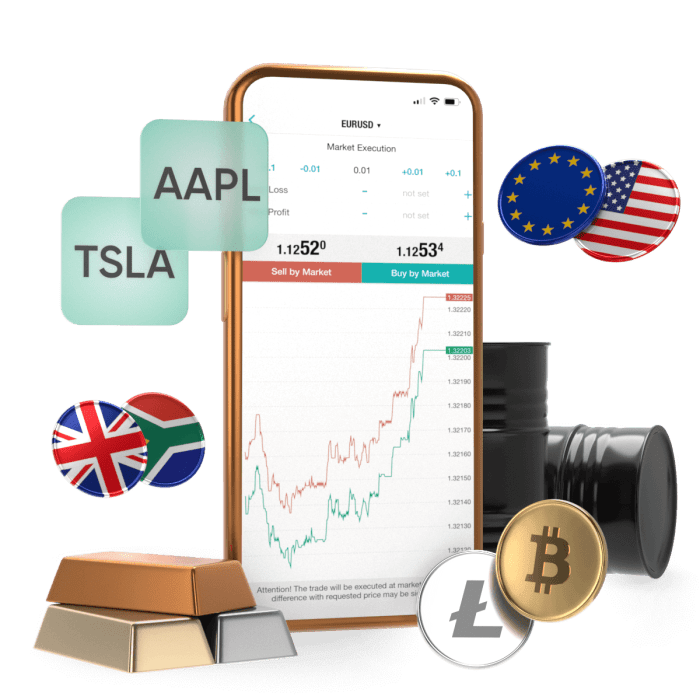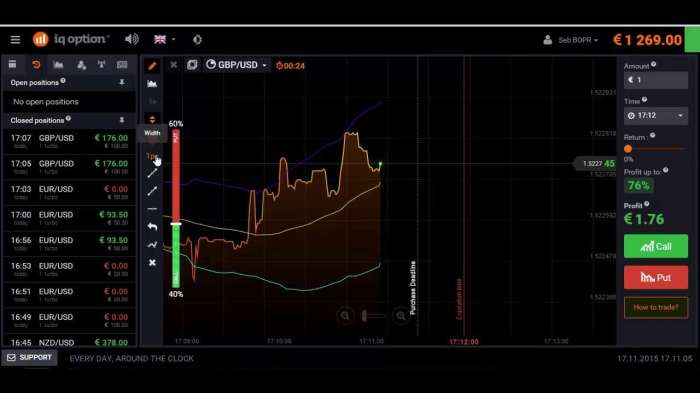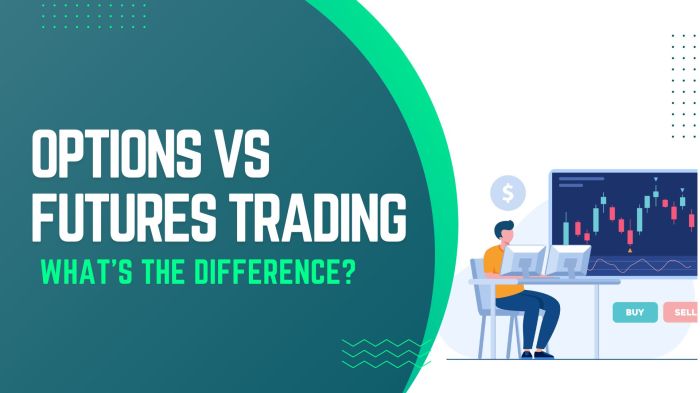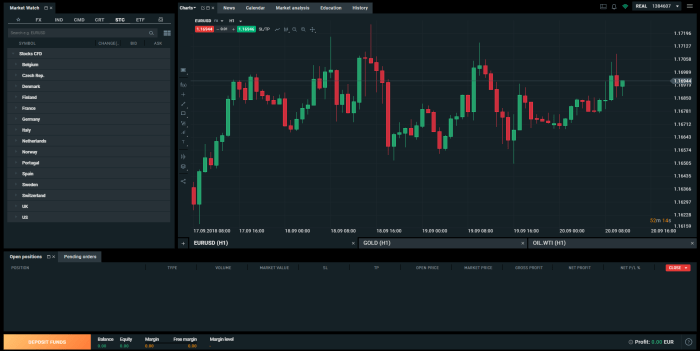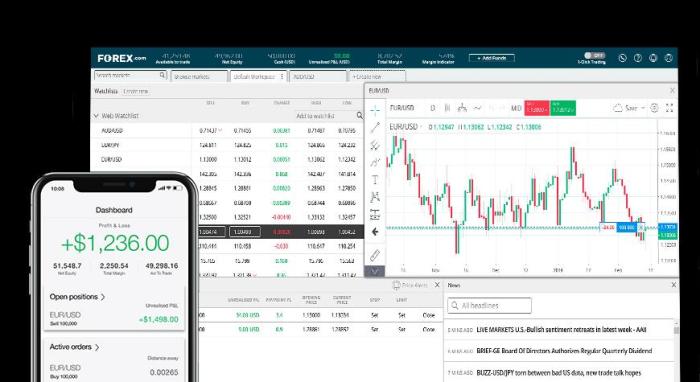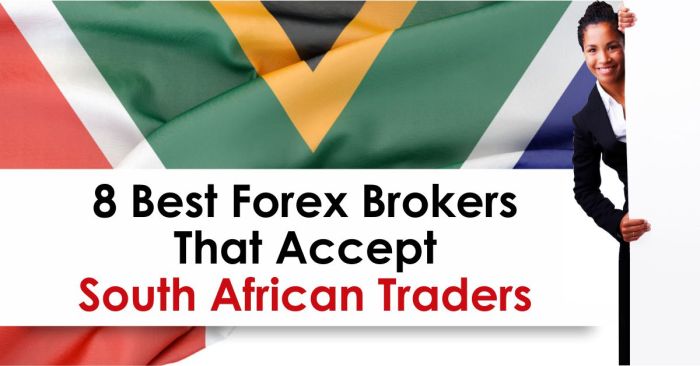
Forex trading brokers in South Africa: Navigating the world of foreign exchange trading in South Africa requires careful consideration of numerous factors. From understanding the regulatory landscape and the diverse types of brokers available, to selecting the right account type and platform, the journey can feel overwhelming. But fear not! This guide cuts through the jargon, offering a clear and concise overview to help you make informed decisions and potentially unlock the exciting opportunities within the South African forex market.
This comprehensive guide delves into the intricacies of choosing a forex broker in South Africa. We’ll explore the regulatory environment, analyze different broker types (ECN, STP, Market Makers), compare account options, and dissect the often-confusing fee structures. We’ll also arm you with the knowledge to critically assess broker reviews and testimonials, ensuring you select a partner that aligns with your trading style and risk tolerance. Ultimately, our aim is to empower you to confidently navigate this dynamic market.
Regulatory Landscape of Forex Trading in South Africa
Navigating the world of forex trading in South Africa requires understanding the robust regulatory framework designed to protect both traders and the financial system. This framework, while stringent, aims to foster a fair and transparent market. Let’s delve into the specifics.
Regulatory Bodies Overseeing Forex Brokers in South Africa
The primary regulatory body for forex brokers in South Africa is the Financial Sector Conduct Authority (FSCA). The FSCA is responsible for overseeing the conduct of financial institutions, including forex brokers, ensuring they adhere to strict regulations designed to protect consumers. While the South African Reserve Bank (SARB) is responsible for monetary policy and the overall stability of the financial system, the FSCA focuses specifically on the conduct of market participants. This division of responsibilities provides a comprehensive oversight of the forex market.
Licensing Requirements for Forex Brokers Operating in South Africa
To operate legally in South Africa, forex brokers must obtain a Financial Services Provider (FSP) license from the FSCA. This license is not easily obtained; it involves a rigorous application process, including background checks, financial audits, and demonstrating sufficient capital reserves. The FSCA scrutinizes the broker’s business model, risk management practices, and client protection measures to ensure compliance with its regulations. Failure to obtain and maintain this license results in severe penalties, including hefty fines and potential legal action.
Investor Protection Measures in Place for South African Forex Traders, Forex trading brokers in south africa
South African forex traders benefit from several investor protection measures. The FSCA mandates that licensed brokers maintain adequate capital reserves to absorb potential losses and protect client funds in case of insolvency. Furthermore, client funds are typically segregated from the broker’s operating capital, reducing the risk of commingling. The FSCA also actively investigates complaints against brokers and takes enforcement action where necessary, providing recourse for traders who feel they have been treated unfairly. The emphasis on transparency and accountability aims to create a safer trading environment.
Comparison of South Africa’s Regulatory Framework with Other Major Forex Trading Jurisdictions
South Africa’s regulatory framework is considered relatively robust compared to some other jurisdictions. While jurisdictions like the UK (FCA) and Australia (ASIC) also have stringent regulations, the specifics differ. For example, the level of capital requirements or the specifics of client segregation might vary. However, the overall goal remains the same: to maintain market integrity and protect investors. Conversely, some offshore jurisdictions have significantly less stringent regulations, posing a higher risk to traders. The choice of where to trade depends on the trader’s risk tolerance and understanding of the regulatory environment.
Comparison of Prominent South African Forex Brokers and Their Regulatory Compliance
The following table compares four prominent South African forex brokers and their regulatory compliance. It’s crucial to independently verify this information with the FSCA’s website, as regulatory status can change.
| Broker Name | FSP License Number (Example) | Regulation Status (Example: Licensed, Under Investigation etc.) | Client Segregation (Yes/No/Partially) |
|---|---|---|---|
| Example Broker 1 | 47000/Example | Licensed | Yes |
| Example Broker 2 | 47001/Example | Licensed | Yes |
| Example Broker 3 | 47002/Example | Licensed | Yes |
| Example Broker 4 | 47003/Example | Licensed | Yes |
Types of Forex Brokers Available in South Africa

Navigating the South African forex market requires understanding the different types of brokers available. Choosing the right broker significantly impacts your trading experience, from the fees you pay to the tools and support you receive. This section breaks down the key categories of forex brokers operating in South Africa, highlighting their strengths and weaknesses to help you make an informed decision.
Market Maker Brokers
Market maker brokers act as the counterparty to your trades. This means they take the opposite side of your position. This structure can offer advantages like quick execution and tighter spreads, particularly for smaller trades. However, potential conflicts of interest exist as the broker profits from your losses. It’s crucial to choose a regulated market maker broker to mitigate risks.
- Advantage: Fast execution, tighter spreads, often user-friendly platforms.
- Disadvantage: Potential conflicts of interest, may not always offer the best price, less transparency.
- Suitability: Beginners who prioritize ease of use and speed, but require careful consideration of potential conflicts.
ECN (Electronic Communication Network) Brokers
ECN brokers act as a conduit, connecting you directly to the interbank market. Your orders are routed to other market participants, offering greater price transparency and potentially better execution. However, ECN brokers often require larger minimum deposits and may charge higher commissions.
- Advantage: Increased price transparency, better execution, potentially lower spreads (though commissions apply).
- Disadvantage: Higher minimum deposits, higher commissions, potential for slippage (price difference between order and execution).
- Suitability: Experienced traders who prioritize price transparency and are comfortable with higher commissions.
STP (Straight Through Processing) Brokers
STP brokers route your orders directly to liquidity providers without intervention. This offers a balance between the speed of market makers and the transparency of ECNs. They typically offer lower spreads than market makers but may still charge commissions. Slippage is less likely than with ECNs but still possible.
- Advantage: Good balance between speed and transparency, lower spreads than market makers, reduced risk of requotes.
- Disadvantage: May still charge commissions, potential for slippage (though less than ECNs).
- Suitability: Intermediate to advanced traders seeking a balance between speed, transparency, and cost-effectiveness.
Examples of South African Forex Brokers
Providing specific examples of South African brokers categorized by type would require continuous updates due to the dynamic nature of the market and potential changes in broker business models. Thorough research of individual brokers, including checking their regulatory status with the FSCA (Financial Sector Conduct Authority), is crucial before choosing a platform. The FSCA website is the best resource for verifying the legitimacy and regulatory compliance of forex brokers operating in South Africa.
Account Types and Trading Platforms Offered: Forex Trading Brokers In South Africa
Choosing the right forex broker in South Africa involves understanding the different account types and trading platforms available. The variety caters to diverse trading styles and experience levels, from beginners dipping their toes into the market to seasoned professionals managing substantial portfolios. Let’s break down the key aspects to help you make an informed decision.
Account Types Offered by South African Forex Brokers
South African forex brokers typically offer a range of account types designed to accommodate different trader needs and capital levels. These commonly include demo accounts, standard accounts, and VIP or premium accounts. Each type presents a unique set of features and associated costs.
Demo accounts are practice accounts loaded with virtual funds, allowing new traders to hone their skills and test strategies without risking real money. They usually mirror the functionalities of live accounts, providing a realistic trading environment. Standard accounts are designed for individual traders with varying levels of experience and capital. These accounts usually offer competitive spreads and leverage options, suitable for both beginners and experienced traders. VIP or premium accounts, on the other hand, are tailored for high-net-worth individuals or those trading substantial sums. These often come with perks like dedicated account managers, tighter spreads, and potentially higher leverage, though they may require a significant minimum deposit. Costs associated with account types usually involve spreads (the difference between the bid and ask price), commissions (fees charged per trade), and potentially swap fees (overnight financing costs). These costs vary significantly between brokers and account types.
Trading Platforms Commonly Used by South African Forex Brokers
South African forex brokers predominantly utilize popular trading platforms known for their functionality and user-friendliness. MetaTrader 4 (MT4), MetaTrader 5 (MT5), and cTrader are among the most widely used.
MetaTrader 4 (MT4) is a veteran platform known for its reliability and extensive customization options. Its user-friendly interface, combined with a vast library of indicators and expert advisors (EAs), makes it a favorite among many traders. MT5, its successor, builds upon MT4’s strengths with enhanced charting capabilities, more advanced order types, and a more robust backtesting engine. cTrader stands out with its speed and advanced charting tools, particularly appealing to scalpers and those focusing on technical analysis. It offers a clean, intuitive interface and excellent order execution speed. The functionalities of these platforms include order placement, charting, technical analysis tools, automated trading capabilities, and access to market news and analysis. The user interfaces vary slightly but generally offer a customizable layout allowing traders to arrange charts, indicators, and other tools according to their preferences.
Comparison of Trading Platforms
The following table compares four popular platforms, highlighting key features and functionalities:
| Feature | MetaTrader 4 (MT4) | MetaTrader 5 (MT5) | cTrader | NinjaTrader |
|---|---|---|---|---|
| Ease of Use | Excellent | Excellent | Excellent | Good |
| Charting Capabilities | Good | Excellent | Excellent | Excellent |
| Automated Trading | Excellent (Expert Advisors) | Excellent (Expert Advisors) | Good (cBots) | Excellent |
| Order Execution Speed | Good | Good | Excellent | Excellent |
| Mobile App Availability | Yes | Yes | Yes | Yes |
| Spreads | Variable (Broker Dependent) | Variable (Broker Dependent) | Variable (Broker Dependent) | Variable (Broker Dependent) |
| Commissions | Variable (Broker Dependent) | Variable (Broker Dependent) | Variable (Broker Dependent) | Variable (Broker Dependent) |
Fees and Costs Associated with Forex Trading in South Africa
Navigating the world of forex trading in South Africa requires a keen understanding of the associated costs. These fees, often seemingly small individually, can significantly impact your overall profitability if not carefully considered. Understanding these charges is crucial for making informed trading decisions and maximizing your returns.
Spreads
Spreads represent the difference between the bid and ask price of a currency pair. This is the core cost of most forex trades and is the primary way brokers generate revenue. A tight spread indicates a smaller difference, translating to lower trading costs. Conversely, wider spreads mean higher costs. Brokers often advertise their average spreads, but it’s important to note that spreads can fluctuate based on market volatility and liquidity. For example, during periods of high market uncertainty, spreads tend to widen, increasing trading costs.
Commissions
Some forex brokers charge commissions in addition to or instead of spreads. These are usually fixed fees per lot traded. The commission structure can vary significantly between brokers, impacting the overall cost of your trades. While a broker with tight spreads might appear cheaper initially, adding a commission could potentially make it more expensive than a broker with slightly wider spreads but no commission. Understanding the total cost, including both spread and commission, is essential for a fair comparison.
Overnight Fees (Swap Fees)
Holding positions open overnight incurs swap fees, reflecting the interest rate differential between the two currencies in a pair. These fees can be positive or negative, depending on the position and the interest rates of the involved currencies. A long position in a currency with a higher interest rate will usually result in a positive swap, effectively earning interest. Conversely, a long position in a currency with a lower interest rate will usually result in a negative swap, representing a cost. These fees are calculated daily and added to or subtracted from your account.
Inactivity Fees
Some brokers charge inactivity fees if your account remains dormant for a specified period. This is a fee for maintaining the account without active trading. The duration and amount of the inactivity fee vary between brokers. It’s important to review your broker’s terms and conditions to understand these charges.
Comparison of Fee Structures
Different brokers employ diverse fee structures, making direct comparisons challenging. However, focusing on the total cost of a trade, considering spreads, commissions, and swap fees, provides a more accurate picture. For instance, a broker advertising low spreads might charge significant commissions, offsetting the apparent advantage.
Impact of Fee Structures on Trading Profitability
The cumulative effect of these fees can significantly impact your profitability. Even small differences in spreads or commissions can erode profits over time, particularly for frequent traders or those with smaller account sizes. Careful selection of a broker with a cost-effective fee structure is, therefore, crucial for maximizing returns.
Calculating Total Trading Costs
Calculating the total cost involves adding up all applicable fees. For example, a trade involving a 0.5 pip spread, a $5 commission per lot, and a $2 overnight swap fee would cost 0.5 pips + $5 + $2 per lot. This total cost needs to be factored into your trading strategy to accurately assess potential profits.
Fee Structure Summary Table
| Broker | Average Spread (USD/JPY) | Commission (per lot) | Overnight Fee (USD/JPY, long position) |
|---|---|---|---|
| Broker A | 0.8 pips | $0 | $1 |
| Broker B | 1.2 pips | $5 | $0.50 |
| Broker C | 1.0 pips | $3 | $1.50 |
| Broker D | 0.6 pips | $7 | $0 |
*Note: These are illustrative examples and actual fees may vary. Always check the latest information directly with the broker.*
Factors to Consider When Choosing a Forex Broker in South South Africa
Choosing the right forex broker is crucial for South African traders. A bad choice can lead to lost funds, frustrating trading experiences, and missed opportunities. This section Artikels key factors to meticulously evaluate before committing to a broker, helping you navigate the South African forex market with confidence.
Regulatory Compliance and Security
Selecting a regulated broker is paramount. Regulation ensures the broker adheres to specific financial conduct standards, safeguarding your funds and providing a degree of protection against fraud. In South Africa, the Financial Sector Conduct Authority (FSCA) is the primary regulatory body for forex brokers. Always verify a broker’s FSCA registration number on the FSCA website before investing. Unregulated brokers pose significant risks, including the potential loss of your entire investment with little to no recourse. Think of it like this: would you trust your money to an unregistered doctor? Probably not. The same logic applies to forex brokers.
Trading Platform and Technology
The trading platform is your interface to the market. A user-friendly, reliable, and feature-rich platform is essential for efficient trading. Consider factors like ease of navigation, charting tools, order execution speed, and mobile accessibility. Some platforms offer advanced features like automated trading (Expert Advisors or EAs) and technical analysis indicators. Compare different platforms offered by various brokers – try demo accounts if available – to find one that suits your trading style and technical proficiency. A clunky, slow platform can be a major hindrance to successful trading.
Fees and Costs
Forex brokers charge various fees, including spreads (the difference between the bid and ask price), commissions, overnight financing fees (swap fees), and inactivity fees. Carefully compare the fee structures of different brokers. A seemingly small difference in spreads can significantly impact your profitability over time. Look for transparent fee schedules with no hidden charges. Remember, seemingly low spreads can be offset by high commissions or other fees. Always calculate the total cost of trading with a broker, not just the spread.
Customer Support and Resources
Reliable customer support is vital, especially when dealing with technical issues or urgent trading matters. Assess the availability of support channels (phone, email, live chat) and their responsiveness. Check online reviews to gauge the quality of customer service. Consider the availability of educational resources, such as webinars, tutorials, and market analysis. These resources can significantly enhance your trading knowledge and skills. A responsive and helpful support team can be the difference between a smooth trading experience and a frustrating one.
Account Types and Minimum Deposits
Different brokers offer various account types catering to different trading styles and capital levels. Consider your trading experience, risk tolerance, and capital before choosing an account type. Compare minimum deposit requirements, leverage levels, and available trading instruments. Some brokers offer micro accounts with low minimum deposits, suitable for beginners. Others offer professional accounts with higher leverage and more advanced features. Choosing an account that aligns with your trading goals and capital is crucial for a positive trading journey.
Security of Funds
Beyond regulation, investigate a broker’s security measures. Do they segregate client funds from their operational funds? This crucial step protects your money in case of broker insolvency. Look for brokers who use secure encryption technologies to protect your personal and financial information. Consider whether the broker participates in investor compensation schemes, offering additional protection in case of unforeseen circumstances. Protecting your capital is as important as choosing profitable trading strategies.
Client Testimonials and Reviews of South African Forex Brokers
Choosing a forex broker is a significant decision, impacting your trading success and financial security. Before committing, thoroughly investigating a broker’s reputation is crucial. Client testimonials and reviews offer invaluable insights into the real-world experiences of other traders, providing a more comprehensive picture than marketing materials alone.
Analyzing client testimonials and reviews requires a critical approach. Simply looking at the number of positive reviews isn’t sufficient; a deeper dive is necessary to determine the authenticity and overall reliability of the feedback. Consider both the positive and negative comments to gain a balanced perspective.
Analyzing Positive and Negative Feedback
Positive reviews can highlight a broker’s strengths, such as excellent customer service, user-friendly platforms, or competitive trading conditions. However, overly enthusiastic or generic reviews should raise suspicion. Look for specific details and examples to support the claims. For instance, a review stating “great customer service” is less valuable than one detailing how a specific customer service representative resolved a particular issue efficiently. Negative reviews, while unpleasant, can be equally informative. They often reveal potential weaknesses, such as slow withdrawals, unresponsive customer support, or hidden fees. Pay attention to recurring negative themes. If multiple reviews mention the same problem, it suggests a systemic issue within the broker’s operations.
Identifying Potential Biases or Inconsistencies in Online Reviews
Online reviews can be subject to manipulation. Some brokers might incentivize positive reviews or suppress negative ones. Be wary of reviews that seem too perfect or lack specific details. Inconsistencies in reviews can also be a red flag. For example, if a broker consistently receives overwhelmingly positive reviews across multiple platforms but has a poor rating on a reputable independent review site, this discrepancy warrants further investigation. Look for reviews on multiple platforms to get a more holistic view. Consider the source of the reviews. Reviews on the broker’s website are inherently biased, while those on independent financial news sites or forums are generally more reliable.
Distinguishing Genuine Reviews from Fake or Manipulated Ones
Genuine reviews tend to be detailed and specific, offering concrete examples to support their claims. They often include both positive and negative aspects of the trading experience, showcasing a realistic perspective. Fake reviews, on the other hand, often sound generic and lack specific details. They may use exaggerated language or focus solely on positive aspects without acknowledging any shortcomings. Look for reviews with grammatical errors or inconsistencies in writing style. These could indicate that the reviews were written by non-native English speakers or generated using automated tools. Check the reviewer’s profile. If the reviewer has only reviewed this one broker, it could be a suspicious sign.
Finding Reliable Sources of Client Reviews and Testimonials
Independent review websites, financial news publications, and online forums are generally more reliable sources of client reviews than the broker’s own website. Look for websites that have a strong reputation for unbiased reviews and a robust verification process. Consider the number of reviews. A larger number of reviews provides a more statistically significant sample size. Focus on reviews from verified users. Some platforms allow users to verify their identities, adding credibility to their feedback. Also, cross-reference reviews from multiple sources. If multiple independent sources mention similar positive or negative aspects, it strengthens the validity of the feedback.
Outcome Summary
Choosing the right forex trading broker in South Africa is a crucial step towards a successful trading journey. By carefully weighing the factors discussed – regulation, fees, platform, and client reviews – you can significantly reduce risk and increase your chances of achieving your financial goals. Remember, thorough research and a well-informed decision are paramount in this competitive landscape. So, take your time, compare brokers, and embark on your trading adventure with confidence.
For descriptions on additional topics like best forex trading system, please visit the available best forex trading system.
When investigating detailed guidance, check out best forex trading training course now.
